Date
The concept of good and bad luck associated with the orientation of a house is a longstanding belief in many cultures, particularly in India. Among these beliefs, the notion that a south facing house brings bad luck often takes center stage. However, before accepting this as gospel, it’s crucial to explore the origins, cultural nuances, and practical considerations that have led to such perceptions. In this article, we will delve into the myths and truths surrounding the idea of a south facing house and whether it genuinely carries bad luck.
Myth 1: Negative Energies Flow In From the South:
One of the most common myths about south facing houses is that they invite negative energies. According to Vastu Shastra, an ancient Indian architectural science, the south is associated with the element of fire. Fire is often seen as a symbol of destruction, which has led to the belief that a south facing house attracts harmful forces.
Truth:
While it is true that Vastu Shastra suggests that a south facing house may not be ideal, it’s essential to understand the context. The notion of negative energies primarily applies to homes with certain structural flaws in their south facing design. These flaws can include improper door placements, window locations, or other architectural elements that disrupt the energy flow within the house. Properly designed south facing homes can be just as harmonious and prosperous as houses facing other directions.
Myth 2: Health and Prosperity Are Jeopardized:
Another myth associated with south facing houses is that they can lead to health problems and financial instability. This belief stems from the idea that a south facing home allows excessive heat and sunlight, which can disrupt the well-being and financial security of the residents.
Read also- Can Rahu Mahadasha Give Good Effects?
Truth:
The notion that health and prosperity are directly jeopardized by a south facing house is an oversimplification. Climate and weather conditions, rather than the direction of the house, have a more significant impact on residents’ health and prosperity. Adequate ventilation, proper insulation, and well-designed living spaces can mitigate the potential issues associated with a south facing orientation.
Myth 3: Marital Discord and Family Issues:
Many believe that a south facing house can bring discord within the family and disrupt marital relationships. This belief is often attributed to the idea that the south facing direction is associated with conflict.
Truth:
Marital discord and family issues can occur in homes of any orientation. The health of family relationships depends on numerous factors, including communication, understanding, and mutual respect. The direction a house faces is not the sole determinant of family harmony. It’s essential to address any relationship challenges directly and not solely attribute them to the direction the house is facing.
Myth 4: South Facing Houses Attract Bad Luck:
The belief that south facing houses inherently attract bad luck is perhaps the most pervasive myth. This superstition often leads potential homeowners to avoid south facing properties altogether.
Truth:
While it’s true that south facing houses are subject to certain Vastu Shastra principles, it’s important to understand that these principles can be adjusted or mitigated through architectural design and interior arrangements. A house’s orientation is just one factor among many that contribute to the overall well-being of its residents.
Myth 5: Financial and Career Downfall:
South facing houses are sometimes thought to bring financial instability and hinder career growth.
Truth:
A house’s orientation alone cannot determine one’s financial and career prospects. Factors such as education, skills, opportunities, and hard work play a much more significant role in achieving success. Many people living in south facing houses enjoy thriving careers and financial stability.
Practical Considerations for South-Facing Houses:
While there are myths surrounding south facing houses, there are also practical considerations that can impact the desirability of this orientation. Here are some factors to think about:
Climate: In regions with scorching summers, a south facing house may receive more sunlight and heat, potentially increasing energy costs for cooling. Adequate insulation, shading, and landscaping can help mitigate these challenges.
Architectural Design: The architectural layout of the house plays a vital role in how residents experience their home. A well-designed south facing house can maximize natural light and ventilation while minimizing potential issues associated with this orientation.
Personal Beliefs: Some individuals may have strong beliefs in Vastu Shastra or Feng Shui. For those who adhere to these principles, it may be essential to consult with experts in these fields when considering a south facing house.
Adaptation: Many cultures have adapted traditional beliefs to modern living. It’s possible to incorporate certain aspects of Vastu or Feng Shui into the design and arrangement of a south-facing house without adhering strictly to ancient principles.
Conclusion:
The belief that south facing houses bring bad luck is based on a combination of cultural myths, superstitions, and interpretations of ancient architectural principles. While there are certain practical considerations that may influence the desirability of a south facing house, it’s essential to recognize that a home’s orientation is just one factor among many that contribute to the overall well-being and luck of its residents. In the end, personal beliefs and practical adaptations can significantly impact the experience of living in a south facing house. It’s important to balance cultural traditions with modern realities when making housing decisions.


